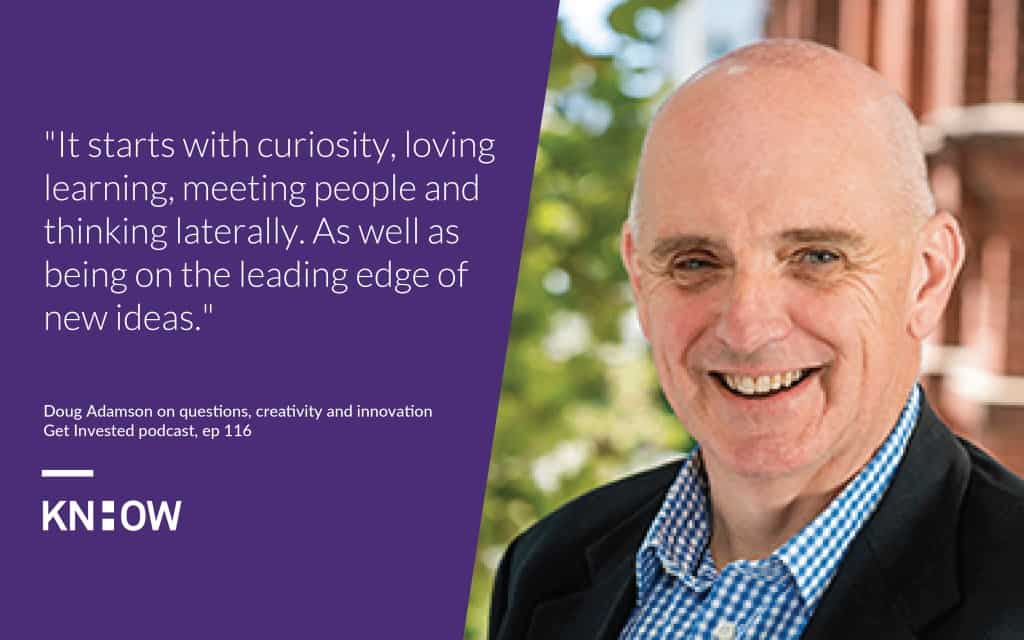Doug Adamson says we should be embracing innovation by asking better questions and investing in new opportunities.
If there’s one thing Doug loves, it’s learning. So much so, if he doesn’t learn something every day, he considers it a ‘day wasted’.
It’s this curiosity, accompanied by a great motivation and high risk tolerance, which has seen Doug commercialise new ideas and entrepreneurially build many innovative companies across the UK, Europe, South East Asia and Australia.
The self-proclaimed ‘information junkie’ explained to KnowHow founder Bushy Martin on the Get Invested podcast that people need to adopt this hunger for information and the ability to ‘ask the right questions’ in order to optimise opportunities and thrive.
“It starts with curiosity, loving learning, meeting new people and thinking laterally, as well as being on the leading edge of new ideas. I’m not very good at looking in the past and looking at history, I’m way more excited about the future opportunities that exist here,” Doug said.
“Question everything when you’re assembling the information about what you need to do, or how you think your industry might be affected, or your job or your group of friends. It is information and understanding that information and analysing that information. That has to be the first step.
“I think secondly it’s knowing yourself and then going, ‘okay, well, because I’ve now got the information and I know myself, let’s think creatively and differently about the options I’ve got’.”
To embrace this creativity and prosper in these challenging times, Doug said people need to focus more on their processes, rather than their intended outcome.
“I think it’s challenging for people to determine what their outcome is going to be … I think what’s more important than focusing on the outcome is the processes to where you’re going as an individual, as an employee, as a business owner etc. So, what is my process that I’m going to go through to help me get out the other end of this?” he said.
To help determine these processes, Doug said people need to be questioning themselves on their strengths, network, skills, adaptability and resilience.
“It’s really a combination of that. But it’s also about trying to figure out, ‘have I got enough information now’? We live in an age where we can get the world’s information on our phones. So I think many people make decisions on opinions rather than information. And information is key in this kind of thing.”
From a business perspective, Doug also said there are three key things which need to be in place for businesses to accept the disruption which has occurred because of COVID-19 and understand how to move forward. These include full engagement of the CEO, permission to fail and commitment to a budget for experimentation.
“If those three conditions aren’t within a business or you’re not thinking about those things in a business in this time, then you really need to, because you’re unlikely to have the same kind of business unless you embrace this,” Doug said.
Moving forward, making innovative decisions and investing in start-up ideas will always come with a risk. However, Doug said he has learned to look at four key elements when investing in a company – people, product, market and systems.
“So each of those makes up a percentage of the investment decision. The ‘people’ is always 50% or 60% of it, the ‘market’ is 15-20%, the ‘product’ is 15-20% and then ‘systems’ [is the remainder]. The system is how I categorise how people run their business. Have they got decent internal systems, financial systems, management systems etc.,” said Doug.
“But now I would much rather invest in good people in a growing market than investing in something that is a whiz bang product, which might have a completely enormous market in three or four years time, with people that are unwilling to learn. They’re such strong believers that the technology is going to be so fantastic, everybody will want one.
“I would far rather invest in companies or products or technologies where the customer is going ‘this solves a problem for me. I really want this’. So, it’s market pull rather than technology push.”
On top of these approaches and areas to consider, Doug also encouraged investors to look at and understand the trends.
“It’s really about looking for the colliding trends in the marketplace and looking at the companies solving the problems in those colliding trends,” said Doug.
“So, what are the trends in the marketplace that are really going to be important in the future? So, even now in this time of pandemic you could say, ‘okay, there’s going to be more home working’. What does that mean in terms of companies that provide services that facilitate home working? Let’s go have a look at them as potential investments.”
Listen to the full interview here.
Want to Know How you can build wealth with the help of leading, qualified experts? Talk to the team at KnowHow, now.




